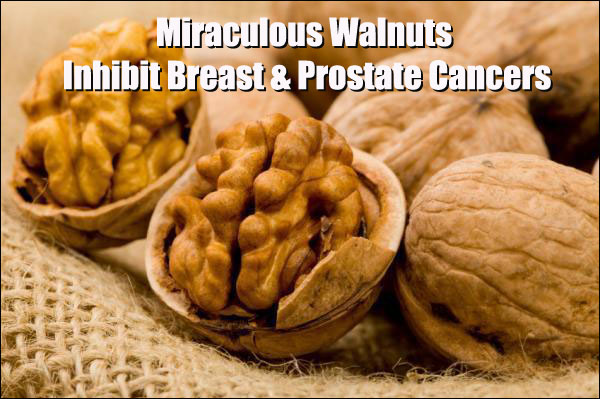 Walnuts Inhibit Breast & Prostate Tumors The study, by Paul Davis, nutritionist in the Department of Nutrition and a researcher with the UC Davis Cancer Center, announced the findings March 22 at the annual national meeting of the American Chemical Society in San Francisco. Davis said the research findings provide additional evidence that walnuts, although high in fat, are healthful. "This study shows that when mice with prostate tumors consume an amount of walnuts that could easily be eaten by a man, tumor growth is controlled," he said. "This leaves me very hopeful that it could be beneficial in patients." Prostate cancer affects one in six American men. It is one in which environmental factors, especially diet, play an important role. Numerous clinical studies have demonstrated that eating walnuts -- rich in omega-3 polyunsaturated fats, antioxidants and other plant chemicals -- decreases the risk of cardiovascular disease. These findings prompted the U.S. Food & Drug Administration in 2004 to approve, for the first time, a qualified health claim for reducing heart disease risk for a whole food. Davis fed a diet with whole walnuts to mice that had been genetically programmed to get prostate cancer. After 18 weeks, they found that consuming the human equivalent of 2.4 ounces of walnuts per day resulted in significantly smaller, slower-growing prostate tumors compared to mice consuming the same diet with an equal amount of fat, but not from walnuts. They also found that not only was prostate cancer growth reduced by 30 to 40 percent, but that the mice had lower blood levels of a particular protein, insulin-like growth factor (IGF-1), which has been strongly associated with prostate cancer. Additionally, Davis and his research colleagues looked at the effect of walnuts on gene activity in the prostate tumors using whole mouse gene chip technology, and found beneficial effects on multiple genes related to controlling tumor growth and metabolism. "This is another exciting study from UC Davis nutrition researchers, where truly promising results that have a molecular footprint are having beneficial effects against cancer," said Ralph deVere White, UC Davis Cancer Center director and a prostate cancer researcher. "We have to find a way to get these kinds of studies on nutritional products funded so that we can truly evaluate their effects on cancer patients." Davis, whose research was funded by a grant to UC Davis from the California Walnut Board, said additional research is needed to further explore how walnuts reduce tumor cell growth. "The bottom line is that what is good for the heart -- walnuts -- may be good for the prostate as well," he said. Walnuts May Prevent Breast Cancer Walnut consumption may provide the body with essential omega-3 fatty acids, antioxidants and phytosterols that reduce the risk of breast cancer, according to a study presented at the American Association for Cancer Research 100th Annual Meeting 2009. Elaine Hardman, Ph.D., associate professor of medicine at Marshall University School of Medicine, said that while her study was done with laboratory animals rather than humans, people should heed the recommendation to eat more walnuts. "Walnuts are better than cookies, french fries or potato chips when you need a snack," said Hardman. "We know that a healthy diet overall prevents all manner of chronic diseases." Hardman and colleagues studied mice that were fed a diet that they estimated was the human equivalent of two ounces of walnuts per day. A separate group of mice were fed a control diet. Standard testing showed that walnut consumption significantly decreased breast tumor incidence, the number of glands with a tumor and tumor size. "These laboratory mice typically have 100 percent tumor incidence at five months; walnut consumption delayed those tumors by at least three weeks," said Hardman. Molecular analysis showed that increased consumption of omega-3 fatty acids contributed to the decline in tumor incidence, but other parts of the walnut contributed as well. "With dietary interventions you see multiple mechanisms when working with the whole food," said Hardman. "It is clear that walnuts contribute to a healthy diet that can reduce breast cancer."
|
Other health related articles on this site:
.
.
.
.
.
.
.
.
.
.
.
.
If you have a suggestion or health related article to submit, send it to:
Editor/viewzone.com
myristicin@hotmail.com